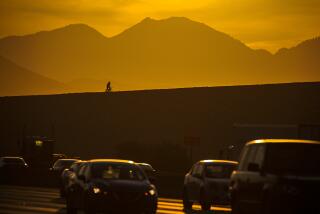Science / Medicine : Need a Boost? Let Sun Shine In, Research Says
- Share via
Unlike plants that turn to face the sun and animals that seem to crave its light, humans have supposedly evolved to the point where we no longer react to changes in light. Not so, according to scientists who see much evidence of light’s physical and psychological effects on us. Their research has the greatest bearing on people who suffer from jet lag or certain types of insomnia, who work night shifts or who experience autumnal or wintertime depression because of shorter, darker days.
A key discovery was that humans--like other creatures--operate according to an inborn circadian rhythm. This inner body clock regulates physiological functions, including our sleep cycle, body temperature and hormone levels. Complicating matters is the fact that humans are out of sync with the turning of the planet: Our internal “day” lasts 25 hours, not 24. So when people are confined to a room without a clock for several days and given no clues about the time of day, they tend to go to bed an hour later each night and wake up an hour later each morning.
Thus, we naturally find it easier to lengthen our days than to shorten them and prefer to go to sleep a few hours later rather than a few hours earlier. This may help explain why it is hard to get up on Monday morning since over the weekend you may have drifted toward your natural 25-hour cycle, going to bed and arising late, thereby resetting your biological clock. It also helps explain why it is easier to adjust to a new bedtime in October when we switch to standard time by gaining an hour than to adapt to the shorter day in April.
Now a Harvard study has suggested that it may be relatively simple to reset the circadian rhythms. Light, it found, affects the inner clock independently of its influence on our sleep/wake patterns. As reported recently in the journal Science, researchers were repeatedly able to readjust the biological clocks in 14 men age 18 to 24 by exposing them to light equal to sunlight in brightness for three five-hour sessions at various stages of their circadian cycle over the course of three days. Circadian rhythms were reset by as much as 12 hours, backward and forward.
These findings may have practical applications. For instance, after a jet trip across many time zones or after a sudden change from a daytime to nighttime work shift, it may take as long as nine days for the body to fully readjust. As a rule of thumb, for each one-hour time zone you cross, it takes roughly one day to recuperate. But properly timed exposure to bright sunlight and/or artificial light may reset the biological clock much more quickly.
While this research is encouraging, more studies will need to be done before scientists can prescribe specific amounts of light for people with circadian disorders. Controlled, objective studies on light therapy, however, are hard to carry out since environmental and social clues about time may augment or even override light’s effects. Meanwhile, after a long jet trip, try to get some “sun time” during the first few mornings and afternoons. Just walk around, sit or even run outside.
If you travel on business and will have to spend all your daylight hours indoors, try to arrive a day early so that you can recover from your flight by getting some light. Despite tiredness, try to go to sleep and awaken at the usual local times. Also remember that most people find it harder to adjust after flying eastward than westward.






